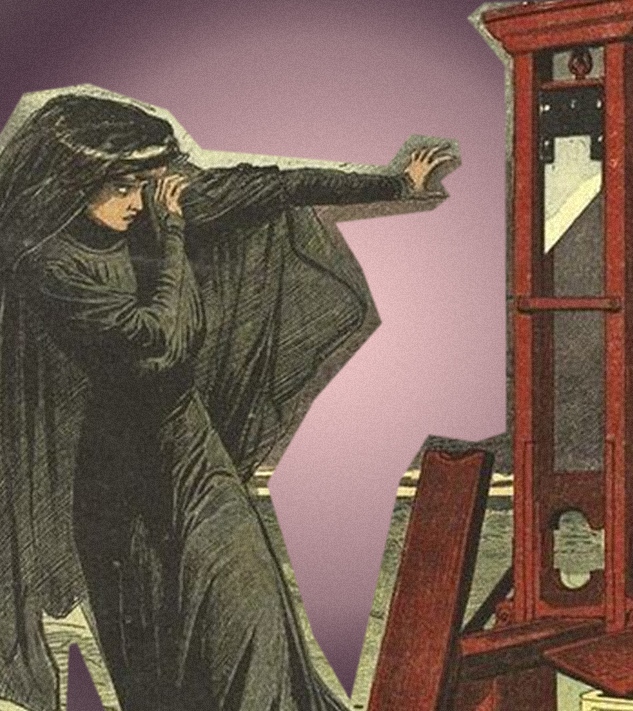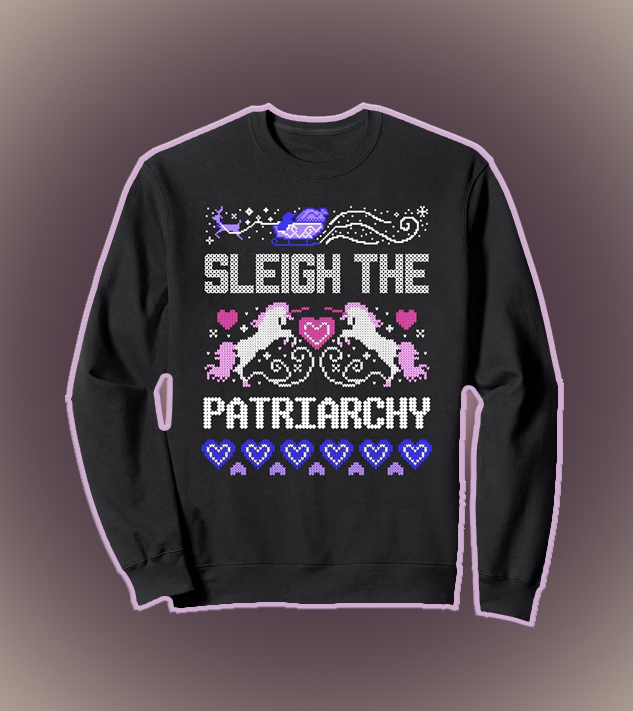Guillotine Them All: The Violence & Context of Internet Slang
Words: Mahika Dhar
Make it stand out
The language we use expresses the sentiment of our time. Until recently, Adderall-riddled millennial start-up-speak dominated: We were circling back, bumping up, optimising, disrupting, and alpha-releasing. Think Kendall Roy. Now, we are slaying, dripping, rizz-ing, clapping-back, and hating. It’s the language of doom-scrolling and being horny all the time. Think of yourself on Twitter.
This April, Riddhi Patel, a twenty-eight-year-old Indian-American, was charged with ten counts of “threatening with the intent to terrorise.” At a local city council meeting, Patel challenged extremist Hinduism and threatened the mayor with murder for failing to back a Gaza ceasefire resolution. Soon after, they were removed from the room.
Cut to a few days later, Patel is fired from their job, alt-right groups mock the event online, and they are visibly distraught as they face federal charges in court. Patel’s most violent remarks include, “I hope one day somebody brings the guillotine and kills all of you motherfuckers” and “[if] you guys want to criminalise us with metal detectors, we’ll see you at your house, we’ll murder you.” As they say it, a ripple of gasps spreads across the sparsely occupied seats at the meeting.
The guillotine – a particularly spectacle-inducing threat – is currently trending on Twitter for a different reason. Stan accounts invoke the guillotine as part of the discernible and violent shift in thirst tweets. Users attach a picture or video of some hot celebrity and write, “Not even a guillotine could stop the head I’d give him.”
Thirst comments are a particularly insightful source to understand the lengths we go to for attention and the violent language we use to achieve it. It’s a self-contained and insulated joke that binds the internet together. On any given day, in any online space, you will see: I’m gagged, you slayed, killed it, what’s your body count? May god bless the dinosaur that died to make the fossil fuel that was treated to become petrol in the car that took her mom to the hospital to give birth. Step on me. Break me like a glow stick. Punch me in the face, thank you.
“Thirst comments are a particularly insightful source to understand the lengths we go to for attention and the violent language we use to achieve it.”
A look into how awkwardly thirsty language translates into “real life” comes through an unlikely source, Buzzfeed. In their Thirst Tweet series, Buzzfeed gathers celebrities and makes them read aloud some of the most graphic, violent, and horny things people say about them. (Aka: Andrew Scott reacts to “Andrew Scott owns my hole”) The videos are always embarrassing; everyone is beet red by the end. They beg the question, if even celebrities — the most complimented, nit-picked, and commented-on group — seem genuinely uncomfortable with these remarks, why do we make them?
To answer, let’s acknowledge that this is the age of the spectacle. In a world of ever-decreasing focus, where the attention economy rules, it is desirable to facilitate the maximum punch (pun intended) for the least cost. To evoke emotion in a limited word count is to have someone pay attention to you, and online languages are built around this understanding.
Until relatively recently internet discourse was niche enough to lack any meaningful basis in reality. Yet with the rise of cancel culture came the shift in what mattered online. Suddenly, the things we said weren’t floating in the ether but were a means of organisation and revolt. This was a powerful switch and facilitated movements and protests, but the internet has also had a flattening and apathetic effect. Discourse becomes content, not because of what is said, but due to the form it inhabits — it’s scrollable and shareable. Yet the language to discuss these issues hasn’t grown in sophistication to match.
An example of content-ified internet language in an offline space came in 2020, when Jeremy Frisch, in a Zoom community meeting, said, “Suck my dick and choke on it. I yield my time, FUCK YOU!” to an LAPD officer. Unlike Patel, who now faces $1 million in bail, Frisch was valourised for it. It was seen as a valid outburst that used the same language we were already deploying, albeit in a different setting. His statements became a slogan of sorts and flooded the internet, pasted atop pastel backgrounds in cute fonts. It was the perfect mixture of rage and comedy, the ideal accompaniment to your feed.
However, as Jane Hu for the New Yorker points out, the effect of this “can be numbing”. The conflation of social media apps with the news and the introduction of online behaviour in institutionalised spaces is unnerving. Hu writes, “The meme-ification of Breonna Taylor’s death — in which calls to arrest her killers are prefaced by mundane observations about, say, the weather — may be the most depressing example yet of how social media can trivialise a movement.”
And Patel’s genuine anger at the complacency behind the Gaza ceasefire resolution was trivialised. Telling the mayor you want to murder him is cavalier online, but in the setting of a city council meeting, it becomes genuinely dangerous. Patel’s case is a microcosm of a larger conversation about the varying contexts of language. It is a reminder that semantics may be malleable only when they exist in pre-defined and communally understood contexts.
Online slang, like the examples I opened this essay with, is almost always attributed to gen z, which is a Kool-aid cultural misunderstanding of linguistic context. To pick just a handful of terms, “slay”, “shade”, and “gag” all have their origins in the ballroom scene: the African American and Latinx LGBTQ+ subculture–particularly in NYC. As they navigated the AIDS crisis, persecution, and exclusion, the negative language associated with them transformed in their hands into slang used as a reclamation. They made inclusion out of exclusion, community out of violence. This language – that we now merely borrow – became “a safe space” for expression. Yet now, upon searching “slay”, I am suggested “slay the patriarchy”, and when I click on it, pages upon pages of “sleigh the patriarchy” is what I must see; all contexts dead and gone, guillotined away.


